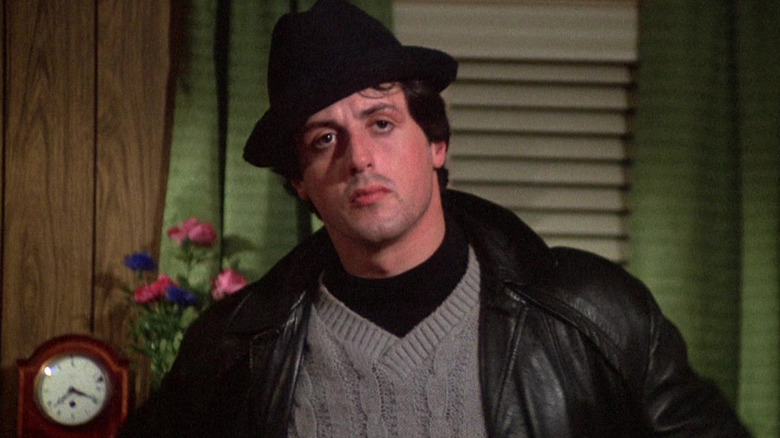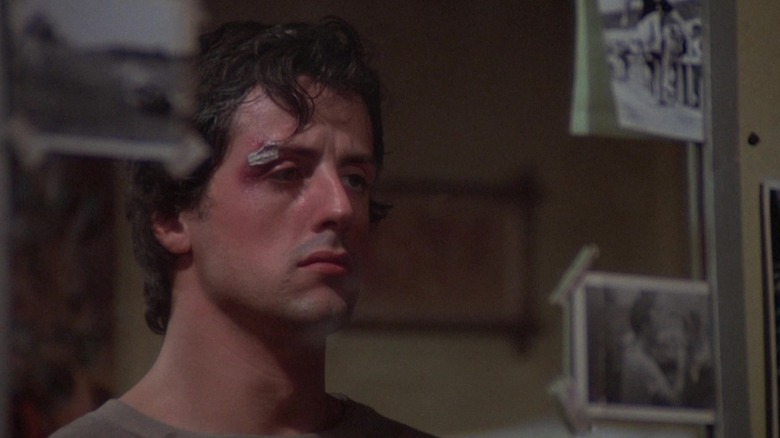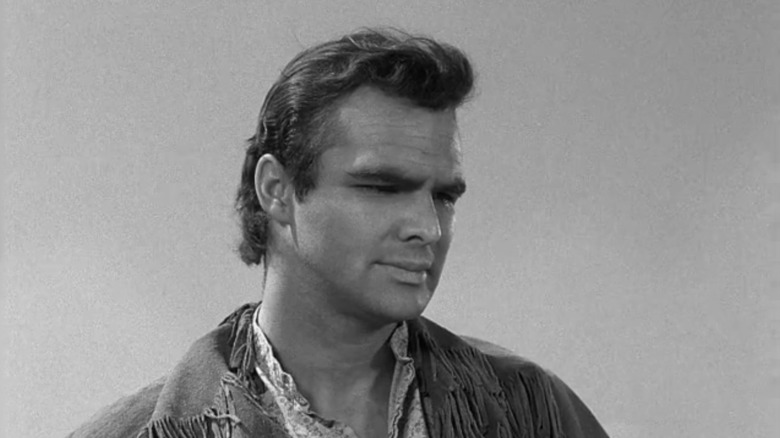Sylvester Stallone Almost Lost His Rocky Role To A Gunsmoke Actor
In 2006's "Rocky Balboa," Sylvester Stallone's aging pugilist delivered a line that perfectly encapsulated the fighter's ethos, and by extension, the ethos of the "Rocky" franchise as a whole. "It ain't about how hard you hit," he says. "It's about how hard you can get hit and keep moving forward. How much you can take and keep moving forward. That's how winning is done!" This short speech in the film that saved the "Rocky" saga has become a bit of a meme in the years since Sly first delivered it, viewed as a sort of melodramatic ode to self-belief that was on the verge of tipping over into Hollywood hyperbole. What stops it from doing so is the fact that you can tell that Stallone believed every word of it, and he had good reason to.
When the actor first wrote "Rocky," he was about as down and out as you could imagine. The man had moved to New York City in 1969 to pursue acting but had frequently found himself homeless, at one point spending four nights sleeping at the Port Authority Bus Terminal where he continually dodged the cops and stored his pens and books in a locker. The only work he found between small acting roles were menial jobs, one of which found him cleaning the lions' cage at the Central Park Zoo. As the actor recalled in a Playboy interview years later, "I told myself, 'This is marvelous, Sylvester. You've gotten to the point in your life where you're making $1.12 an hour to get pissed on by a lion.'"
With a pregnant wife and the threat of being kicked out of his apartment looming, Stallone committed himself to writing a movie that he hoped would provide him with the leading role for which he'd been searching ever since making the move to the Big Apple. "Rocky" was the result. For Stallone, it was imperative that he star, but when he did eventually court attention from a studio, the executives had other plans.
Sylvester Stallone had to fight to star in his own movie
Asked about his motivation for writing "Rocky" in a 1977 BBC interview, Sylvester Stallone spoke about his feeling that movies at the time "were at an all-time low," explaining, "Everything was anti-society, anti-Christ, anti-government, anti-everything, and there was no one to root for." The way Sly saw it, Hollywood hadn't "made any good old-fashioned type films where morality was at the forefront," and he was going to provide such a hero. In this optimistic sensibility, you can see the seeds of his famous 2006 "Rocky Balboa" speech, but it was arguably his struggle to secure the lead role in his own movie that really solidified his "how hard you can get hit" mentality.
The then-struggling actor had written Rocky Balboa as an extension of himself. As he revealed in his BBC interview, the Italian Stallion was modelled not on his own experiences, but on his own "aura." "I surely couldn't pass myself off as a lawyer in a three-piece suit," he said, "so I wanted to take it much more basic — a man from the street. All right, what kind of a man? An underdog." Stallone landed on a professional fighter, and finished the first draft of the "Rocky" script in three and a half days. He then shopped it around, and remarkably, given his relative obscurity as an actor, let alone a writer, found buyers in the form of Irwin Winkler and Robert Chartoff and their Chartoff-Winkler Productions.
Still, Stallone faced strong resistance to the idea of him playing Rocky, but remained resilient. As he told The New York Times, "I told my wife that I'd rather bury [the script] in the back yard and let the caterpillars play 'Rocky.' I would have hated myself for selling out, the way we hate most people for selling out." During this time, Sly was represented by Craig T. Rumar and Larry Kubik's Film Artists Management Enterprises, and it was this company that handled the negotiations with Chartoff-Winkler — though there is some controversy surrounding these negotiations, with Stallone maintaining to this day that he was robbed of any long-term ownership of the franchise as a result of the original deal. But as Rumar's son told World Boxing News in 2020, "Through the efforts of my father and Mr. Kubik, Chartoff-Winkler agreed to produce Rocky with United Artists."
Even after Winkler, Chartoff, and United Artists were onboard, however, Stallone faced pressure to step aside and let an established star take the lead role, and it seems there was one well-known "Gunsmoke" actor in line.
Burt Reynolds was in the running for Rocky
In an interview with the Los Angeles Times, Irvin Winkler recalled the difficulties he and Robert Chartoff had in getting United Artists to agree to put up the money for "Rocky." "They gave us all the reasons the film would be a disaster," he said. "Fight pictures don't do well. Women won't go. It's violent, and people don't like violence. It will never sell overseas. Not only all that, you want to star this unknown, Sylvester Stallone."
At the time, it seems the studio wanted an established star to lead "Rocky," and had one actor in their sights: Burt Reynolds. It's unclear whether Winker and Chartoff pushed as hard for Reynolds or whether it was mainly United Artists, but according to the New York Times, before Stallone even sold the script, he was pushing back against requests to cast bigger actors, including Reynolds, James Caan, and Ryan O'Neal. According to the Times, all the producers bidding for the script wanted a big actor.
At the time, Reynolds was as big a star as they get. He'd made his name starring in "Gunsmoke" alongside co-star James Arness from 1962 to 1965, playing the part of blacksmith Quint Asper following the departure of Dennis Weaver, who portrayed Marshal Matt Dillon's deputy Chester Goode on the Western series. Reynolds felt his time on "Gunsmoke" had come to an end after three years, and he moved on to more TV shows before landing his breakthrough role as Lewis Medlock in 1972's "Deliverance." He then fronted more hits, including 1973's "White Lightning" and 1974's "The Longest Yard." As such, Reynolds' involvement certainly wouldn't have hurt the chances of "Rocky" being seen by the masses, but there's no doubt Stallone was the man for the job. Thankfully, Sly already knew how to take the punches and keep moving forward even before he portrayed the Italian Stallion on-screen, and wouldn't let up until he got his way.


